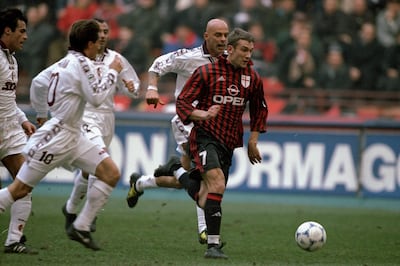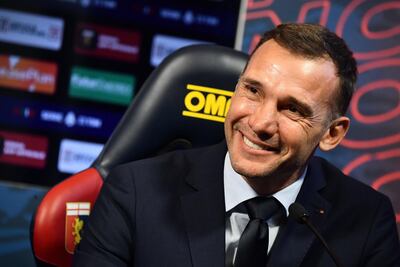It has been a while since the Ballon d’Or was handed over to a centre-forward. Cristiano Ronaldo won his while conquering Europe from wide attacking positions. Lionel Messi’s attacking territory has always been defined according to his unique map of the pitch. Those two, with brief interruptions, dominated the award for the best part of a decade and a half.
To find the last great penalty box predator polling most votes for football’s most prestigious prize you need to scroll back to Andriy Shevchenko, in 2004. His goals had led AC Milan to the Serie A title. A year earlier he had spearheaded the claiming of the Champions League.
Being from Ukraine, the chance of a major international trophy was always out of realistic reach, but Shevchenko, his country’s greatest ever marksman - 48 goals from 111 caps - would later gain a twin distinction of having captained Ukraine to their best World Cup finish, the last eight in 2006, and managing them to their best European championship, a quarter-final where they were defeated by England in this year’s tournament.
As he kept half an eye, on Monday night, on the announcement of the 2021 Ballon D’Or winner, Shevchenko was planning for the most charged fixture yet of his first foray into club coaching. He has recently taken over at Genoa, who are struggling in Italy’s top division. On Wednesday, they host Milan.
“There will be a lot of emotion,” he said of coming up against the club where he played 322 games, and scored 175 times. It might feel a little too soon for such a resonant fixture in that Shevchenko has only had two games in charge of Genoa so far. Yet he may believe this is not a bad moment to be taking on a Milan who, with Napoli, had been setting the pace in Serie A until a run of 31 points from 11 matches screeched to a sudden halt. Milan have lost their last two league games, conceding seven goals in the process.
That makes Genoa the form team ahead of Wednesday, although the Shevchenko reign so far reads modestly. He debuted on a Serie A touchline with a 2-0 loss at Roma. On Sunday, Genoa drew 0-0 at Udinese.
“I saw some solidity, which is satisfying,” the new coach said of his first point, “and I’m happy with how the players are working and taking on my ideas.” The next phase, beyond appreciating the club’s second clean sheet of the campaign, is for the legendary former goalscorer to stimulate goals. Genoa’s sole victory so far dates back to the second week of September. They sit 18th in the table, inside the relegation zone.

The oldest club in Serie A has been through tumultuous change in the last two weeks, beyond the sacking of coach Davide Ballardini and his replacement with Shevchenko, an illustrious name but a novice in club management.
In mid-November, the club was sold to a US investor, 777 Partners, who appointed Alberto Zangrillo as club president. Zangrillo is better known as an eminent doctor, with an especially well known client: Zangrillo has acted for many years as physician to Silvio Berlusconi, former president of Italy, and major stakeholder at AC Milan for three decades up until 2017.
Hence the widespread speculation that Berlusconi, now 85, had some discreet, indirect say in bringing Shevchenko back into Italian football, just as he brought him in as a quick, intuitive 22-year-old from Dynamo Kiev in 1999 to join an already star-studded Milan squad. Berlusconi and ‘Sheva’ remained close, their relationship surviving Shevchenko’s move to Chelsea in 2006. He would be less successful in the Premier League and returned briefly to Milan before seeing out his playing career back in Kiev.

There, Shevchenko thought for a period he might go into politics, standing in vain for a seat in Ukraine’s parliament in 2012. Later that year, he turned down an approach to manage the national team, but gradually came around to the idea, accepting the post in 2016.
He had by then seen a number of former teammates make a success of coaching, from current Al Ain head coach Sergei Rebrov, his former striking foil at Dynamo, to ex-Milan colleagues like Gennaro Gattuso and Filipo Inzaghi.
But in the select field of former Ballon D’Or winners, successful club coaches are increasingly rare. With the exception of Zinedine Zidane, who claimed the award in 1998, there are few from the last 25 years who have pursued, or thrived in, a second career on the touchline in a leading European league.
Shevchenko has taken on a stiff challenge, but knows that if he galvanises Genoa, he will be looked on favourably for the Milan job at some future date.

